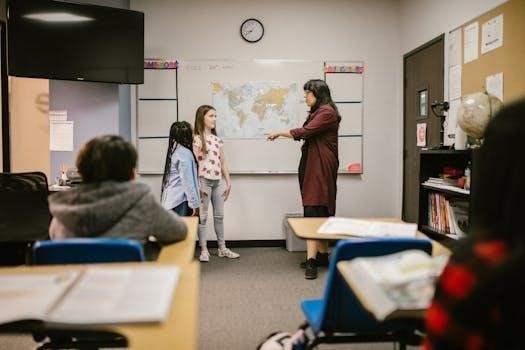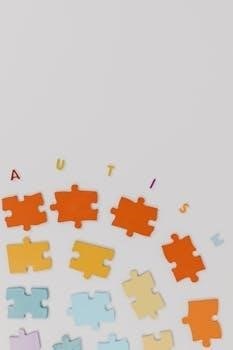special instruction therapy

Definition of Special Instruction
Special instruction‚ as defined by federal regulations‚ is adapting content‚ methods‚ or delivery to meet unique needs stemming from a child’s disability. It ensures access to education and is provided at no cost to parents.
Federal Definition of Specially Designed Instruction
The federal definition of specially designed instruction (SDI)‚ as outlined in 34 CFR 300.39(b)(3) of the Individuals with Disabilities Education Act (IDEA)‚ emphasizes adapting the content‚ methodology‚ or delivery of instruction to address the unique needs of an eligible child with a disability. This adaptation is crucial for ensuring that the child can access the general curriculum and make meaningful educational progress. Furthermore‚ SDI is provided at no cost to parents‚ highlighting its importance in the provision of a free and appropriate public education. The focus is on individualization and tailoring the educational approach to each student’s specific challenges. This definition underscores the federal commitment to providing appropriate educational experiences for all children with disabilities.
Role of Special Instruction in Early Intervention
In early intervention‚ special instruction plays a vital role in supporting young children with developmental delays and disabilities‚ typically from birth through age three. This service focuses on enhancing a child’s learning opportunities to positively impact overall growth‚ encompassing social‚ emotional‚ and cognitive development. Early intervention special instructors work with families to structure appropriate learning goals and routines that help in a child’s daily life. These professionals‚ often with advanced degrees‚ focus on improving play skills‚ social interactions‚ and cognitive development. The goal is to maximize a child’s potential by integrating specialized support into their natural environment and routines‚ working collaboratively with families and other professionals.

Key Aspects of Special Instruction
Key aspects include customized strategies‚ Individualized Education Plans (IEPs)‚ and integrated co-teaching. These elements ensure instruction is tailored to each student’s unique needs‚ promoting effective learning outcomes.
Customized Instructional Strategies
Special instruction employs a wide array of instructional techniques‚ carefully chosen to match each student’s unique learning style‚ strengths‚ and challenges. These strategies are not one-size-fits-all; instead‚ they are tailored to address the specific educational requirements of the individual. Providers utilize evidence-based practices and research-backed approaches to ensure the most effective learning experience. This may involve modifying the presentation of material‚ adjusting the pace of instruction‚ or incorporating various sensory tools. The emphasis is on adapting the learning environment and methods to maximize each student’s ability to understand and retain information. The goal is to foster both academic and personal growth.
Individualized Education Plans (IEPs)
Special instruction is fundamentally guided by Individualized Education Plans (IEPs)‚ which are customized roadmaps outlining specific goals and strategies for each student. These plans are developed through a collaborative effort by a team that includes parents‚ educators‚ therapists‚ and other relevant professionals. The IEP details the student’s present levels of performance‚ measurable annual goals‚ and the specific services and accommodations needed to achieve those goals. IEPs are not static; they are reviewed and updated regularly to ensure that the student’s changing needs are continuously addressed. The aim of an IEP is to provide a tailored educational experience.
Integrated Co-teaching Services
Integrated co-teaching services involve the collaborative delivery of specially designed instruction and academic instruction to a diverse group of students‚ including those with and without disabilities. This model promotes an inclusive learning environment where all students benefit from the expertise of both general education and special education teachers. In this setting‚ educators work together to plan and implement lessons‚ adapt materials‚ and provide differentiated support to meet the varied learning needs within the classroom. Co-teaching aims to enhance learning outcomes for all students‚ fostering a sense of belonging and shared responsibility for academic success. This approach ensures that students with disabilities are fully integrated.

Personnel Involved in Special Instruction
Special instruction involves various professionals‚ including special instructors (SIs)‚ special education itinerant teachers (SEITs)‚ therapists‚ and support staff. These individuals collaborate to provide comprehensive services.
Special Instructors (SIs) and their Role
Special Instructors (SIs) are interventionists who specialize in supporting the social‚ emotional‚ and cognitive development of young children. Their primary goal is to enhance a child’s learning opportunities‚ positively impacting their growth and development. SIs address a child’s overall progress‚ structuring appropriate learning and developmental goals. They focus on improving areas such as play skills‚ social interactions‚ cognitive abilities‚ motor skills‚ and language development. Collaborating closely with parents and other team members‚ SIs work to support families in their daily routines‚ promoting positive development and growth. They are teachers with advanced expertise in specific areas‚ providing support in those domains‚ and may hold certifications in areas like visual or hearing impairments.
Special Education Itinerant Teachers (SEITs)
Special Education Itinerant Teachers (SEITs) provide specialized instruction to preschool students with Individualized Education Programs (IEPs). SEITs deliver services on an itinerant basis‚ meaning they travel to the child’s childcare or educational setting. They offer individualized or small group instruction‚ and may also provide indirect services‚ to support the students’ educational needs. SEITs work closely with the child’s educational team and family‚ to implement the IEP and ensure that the child’s unique learning requirements are addressed within their natural environment. The focus is on integrating support within the child’s daily routine‚ promoting learning and development in a natural and familiar context.
Therapists and Support Staff
A variety of therapists and support staff play crucial roles in special instruction. This team often includes licensed therapists specializing in areas such as behavior‚ play‚ and sensory integration‚ addressing diverse developmental needs. Certified special instructors work closely with children‚ families‚ and the educational team to develop and implement individualized plans. They provide direct therapeutic services‚ parent education‚ and support groups‚ promoting the child’s overall development and well-being. Support staff may include specialists in areas such as vision support and nutrition‚ offering targeted interventions to meet specific needs. The collaborative approach of this team ensures comprehensive care for each child.
Areas of Focus in Special Instruction
Special instruction emphasizes social‚ emotional‚ and cognitive growth‚ addressing behavioral challenges and providing support for sensory and physical needs. These areas are crucial for a child’s overall development.
Social‚ Emotional‚ and Cognitive Development
Special instructors focus on nurturing the social‚ emotional‚ and cognitive growth of young children. They aim to boost learning opportunities to positively impact development. This includes improving play skills‚ social interactions‚ and cognitive abilities. Special instructional strategies are employed to enhance understanding and expression of emotions‚ as well as fostering positive peer relationships. Interventionists work to create environments that encourage exploration‚ problem-solving‚ and overall cognitive development. These professionals understand the importance of a holistic approach‚ addressing all aspects of a child’s development.
Addressing Behavioral Challenges
Special instruction includes behavior support‚ helping children replace negative behaviors with positive actions. Interventionists work to reduce or eliminate challenging behaviors such as tantrums and difficulties with sleeping or potty training. They also assist with attention and focus on tasks‚ transitions‚ and following directions. The goal is to build healthy routines and smooth transitions‚ fostering positive behaviors. These professionals collaborate with families to implement strategies consistently across various settings. A key component is providing parents with the support they need to help their child succeed.
Support for Sensory and Physical Needs
Special instruction addresses sensory and physical needs‚ including vision support. Vision interventionists assess how a child’s vision impacts development and access to their environment. They teach orientation and mobility‚ utilizing tools like light boards and braille. For physical needs‚ school-based physical therapy may be provided to improve a student’s ability to access their education. This type of support helps with movements‚ increasing accuracy and amplitude. Furthermore‚ special instruction considers sensory integration to enhance a child’s ability to respond appropriately to sensory input.

Specialized Support Services
Specialized support includes vision intervention by certified teachers who assess visual impact on development‚ and nutrition support from dietitians addressing feeding issues and dietary needs. These services are critical.
Vision Support Intervention
Vision support intervention is delivered by certified Teachers of the Visually Impaired (TVIs) who possess specialized knowledge in education. These interventionists evaluate how a child’s vision affects their development and interaction with the surrounding environment. They are qualified to teach basic orientation and mobility skills within indoor settings‚ ensuring that children with visual impairments can navigate their spaces effectively. TVIs utilize various assistive technologies‚ including both low-tech and high-tech devices‚ such as lightboards and braille resources‚ to enhance the learning experiences for these children. This specialized support is critical in promoting early development and access to education.
Nutrition Support
Nutrition support is provided by registered dietitians or nutritionists who specialize in addressing the unique dietary needs of children. These professionals assist with various feeding issues‚ ensuring proper nutritional intake for optimal growth and development. They offer guidance on transitioning from g-tube to oral feeding‚ provide suggestions for children with selective eating habits‚ and calculate individual nutritional requirements. Dietitians also make dietary change recommendations‚ and adjustments as needed; They possess experience working with infants and toddlers‚ including those with NICU backgrounds‚ which enables them to handle a range of complex nutritional challenges. These services aim to support overall health and well-being.

Challenges and Considerations
Addressing diverse needs and learning styles presents a significant challenge. Each child’s uniqueness requires flexibility and individualized approaches to ensure effective special instruction therapy.
Addressing Diverse Needs and Learning Styles
Special instruction therapy faces the significant challenge of catering to the wide spectrum of individual needs and learning styles. Children present with varying cognitive‚ emotional‚ social‚ and physical differences‚ demanding a highly personalized approach. What proves effective for one student may not yield the same results for another. Therefore‚ therapists must demonstrate flexibility‚ creativity‚ and a deep understanding of each child’s unique profile. Employing evidence-based practices and adapting them to individual circumstances is crucial. This involves considering sensory sensitivities‚ preferred learning modalities‚ and any specific challenges that may hinder a child’s progress. Continuous assessment and modification of strategies are essential to ensure that therapy remains effective and relevant for each child’s unique journey.